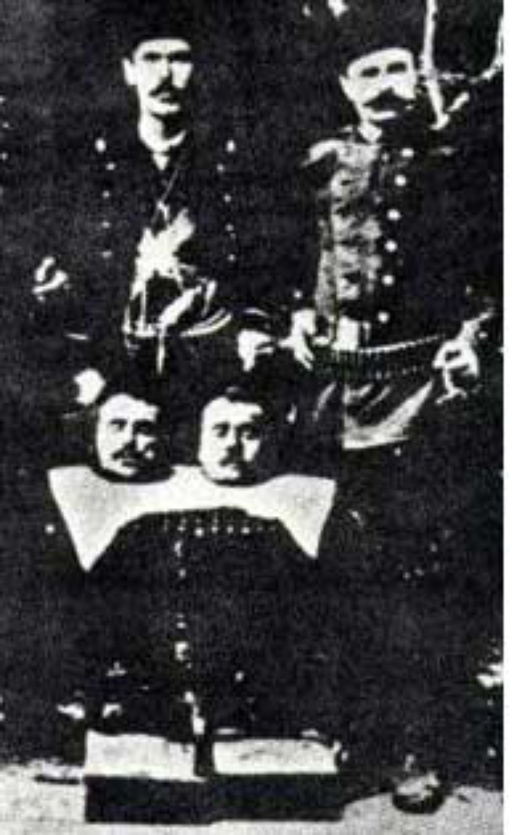The historic Turkish lie
Published on
Translation by:
 christina green
christina green
Between 1915 and 1916 it is estimated that there were up to 1,5 million Armenians killed in the Ottoman Empire. Yet even today, the Turkish government denies the claim that there has ever been genocide.
 Anti-Armenian sentiment, although already in existence, was aggravated by the onset of the First World War. The Committee of Union and Progress (CPU), the anti-Christian and nationalist dictatorial regime which had reigned since 1913, attempted to portray the Armenian population as an enemy of the state which had to be defeated. The Turkish attempted to conquer the Armenians in order to prevent them from cooperating with enemies, such as Russia, who were trying to defeat the Ottoman Empire. Despite this, the mass killings of Armenians cannot be simply described as combating an enemy of the state.
Anti-Armenian sentiment, although already in existence, was aggravated by the onset of the First World War. The Committee of Union and Progress (CPU), the anti-Christian and nationalist dictatorial regime which had reigned since 1913, attempted to portray the Armenian population as an enemy of the state which had to be defeated. The Turkish attempted to conquer the Armenians in order to prevent them from cooperating with enemies, such as Russia, who were trying to defeat the Ottoman Empire. Despite this, the mass killings of Armenians cannot be simply described as combating an enemy of the state.
From the 24th April 1915 onwards, members of the Armenian Elite were imprisoned, tortured and killed. This was followed by a systematic deportation of the remaining Armenians by members of the army and volunteers, who were rewarded for their work with pilfered Armenian possessions. Their aim was not resettlement but elimination. This meant that men were instantly killed in most cases, whereas the women and children were transported to concentration camps in the Syrian desert. Three quarters of the people who survived this traumatic deportation, which was frequented by several robberies and massacres carried out by the army, were brutally killed or simply died from starvation or serious illnesses. The outcome: between 50 and 75 % of the estimated 2 million strong Armenian population was killed in this genocide. There are no exact numbers or figures because documentary records were destroyed instantly and, in most cases, scientists have no access to their archives.
Is it all a lie?
The official statement of the Turkish government is that “None of this is true.” They claim that the Armenians massacred many Turks, despite the Turkish people treating them as equal citizens. It is also argued that the Armenians aided the European Superpowers in splitting the Ottoman Empire. It was on this basis that the Turkish army arrested the Armenian elite and apparently only conspirators were deported. Indeed, the Turkish claim that there were no massacres but only humane, and limited, deportation.
However, if one looks at the facts, the Turkish Ministry of Culture’s statement that “This was the most successful deportation undertaken by any government or state in the world” seems a mockery. The Armenian genocide is the greatest political taboo of the country. In 1978 Turkey did not permit the UN to publish a referral to the events of 1915-1916 as genocide and, consequently, it is only since 1987 that ‘Armenian genocide’ has been mentioned in official UN records. There are still countries which do not recognise the Armenian genocide in order to maintain relations with their political allies, like, for example, Germany. The decrees of the Turkish Minister of Education, Hüseyin Celik, in 2002 and 2003, force Turkish schoolchildren to write essays denying the “Pseudogenocide”. Additionally, journalists and human rights activists, who publicly criticise the denial of the genocide, are put under pressure and threatened.
Genocide and the entrance to the EU
Since 1987, the European Parliament has asked the Turkish government three times to acknowledge the genocide, or else not be admitted into the EU. The Council and the Commission refrain from commenting and the current member states of the EU are unlikely to back the European Parliament’s threat since several countries do not officially recognise the mass killing as genocide. But should acknowledgement of the genocide be a requirement for Turkey to join the EU? The answer of the Commission: it is not included in the Copenhagen criteria. As a result, it seems that Turkey is not particularly worried about giving in to the Parliament’s demand. However, the EU should not let Turkey get away with their historic lie. Tessa Hoffmann, an expert on Armenia, stated: “Affairs like the Celik-decrees of 2002 and 2003 are a real lapse, which the EU should not overlook. It was the EU, after all, who subsidised the Turkish ministry.” The EU has to ask itself whether or not a country which cannot come to terms with its own history and which does everything to dodge and deny the truth is fit to join its ranks.
Translated from Die türkische Geschichtslüge


